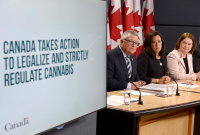Support strong Canadian climate journalism for 2025
The federal government has tailored its highly anticipated marijuana legislation to ensure younger teens don't wind up with criminal records for pot possession.
Currently, people between 12 and 17 can be charged for having any amount of marijuana, but the newly tabled legislation proposes that people under age 18 would not face criminal prosecution for possessing or sharing up to five grams.
Bill Blair, a Liberal MP working with federal ministers on the legislation, said Monday the ultimate goal is to give provinces and territories flexibility to prohibit young people from possessing any amount of cannabis, with the option to introduce non-criminal sanctions for having a small amount.
"There are far better ways to deal with those offences that don't result in a criminal record, which are quite frankly more straightforward to enforce, less onerous to enforce, less costly to enforce but also achieve a much better social outcome by not giving those kids a criminal record," he said.
Provinces could bring in a regulatory ticketing system — much like the one in Ontario for those under 19 caught purchasing, possessing or drinking alcohol, he noted.
This requires "basic regulation" for the provinces, said Blair, a former Toronto police chief.
"I'm not minimizing the amount of work that needs to be done," he said. "This is pretty straightforward . . . I've enforced those laws for 40 years so I'm familiar with how they work."
He also challenged the suggestion responsibilities have been downloaded on the provinces.
"Actually, we want to make sure the rules and regulations that are put in place, in order to be effective, in order to achieve what it is we want to achieve, they've got to be at the right level of governance."
Many issues to iron out before weed legalized
The possession changes are among the many issues Ottawa and the provinces and territories need to iron out before marijuana is legalized next year including distribution, licensing and retail sales.
Toronto-based criminal lawyer Daniel Brown said Monday courts generally don't prosecute minor marijuana possession charges for people under or over 18, noting these cases are often dealt through a diversion program designed to steer them out of the court system.
"Normally, what it takes is someone to do some community service or in some instances they will make a donation to charity in order to secure a withdrawal of their charges," Brown said.
Criminal sanctions could be dropped meantime
The problem is this approach still requires resources to bring these people into the court system, whether they are young offenders or adults facing minor marijuana charges.
"By making it not a criminal act, they are going to ensure the resources that are otherwise spent dealing with these individuals in the court system can be better used elsewhere, especially given there are so many cases in the court system that are in jeopardy of being thrown out due to delay," he said.
New Democratic Party justice critic Alistair MacGregor said Monday he very much agrees that criminal sanctions for marijuana possession can have detrimental impacts, particularly for young people, but he expressed frustration about why government did not address the problem sooner.
"It is going to take another 18 months to bring it into effect," MacGregor said. "These are provisions that could have been brought in as an interim measure long ago. ... The federal government had the ability to act."





Comments
I wholeheartedly agree with Mr. Brown that the volume of legal personnel and time spent on marijuana cases has resulted in our legal system to grind slowly and in some cases to a halt. All this for a substance that for 5000 years was valued as a food, medicine and for spiritual practices. It has only been the last 70 years that we as an evolved civilization saw fit to ban it. (Banning sugar given all the diseases and body dysfunctions it causes would make sense but I know there is no corporate or public interest in this happening.)
My concern/hope is the new laws do not make criminals out of parents giving their epileptic and cancer afflicted children their medicine - the essential oil of the marijuana plant. That would be a double travesty.
There seems to be a lot of rhetoric around this bill. I fear it will be like so many of this Trudeau party's promises, half baked because he is afraid to do the wrong thing, unless it is what he wants to do and then gangbusters ahead - damn public opinion.